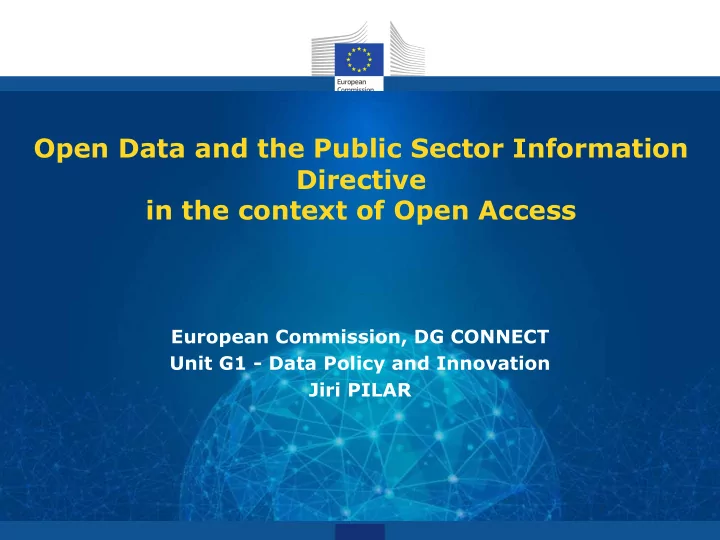

Open Data and the Public Sector Information Directive in the context of Open Access European Commission, DG CONNECT Unit G1 - Data Policy and Innovation Jiri PILAR
The potential of data European Council meeting (28 June 2018) "High-quality data are essential for the development of Artificial Intelligence. The European Council invites the co-legislators to swiftly examine the latest data package." Societal benefits Easier and better lives for individuals Addressing societal challenges Economic growth Potential to double the size of the data economy (4% of EU GDP by 2020) Data can improve efficiency of all economic sectors
Public Sector Information Directive 2003/98/EC Requirements to ensure that accessible public sector information can be re-used across sectors Re-use for commercial or non-commercial purposes Public bodies are obliged to: • address re-use applications within a time limit • limit charges: marginal cost of reproduction (subject to exceptions) • be transparent on conditions for re-use • avoid discrimination between re-users • limit use of exclusive arrangements
The European Data Portal - facts & figures - 34 countries 850.000 Metadata in 24+1 Languages 77 catalogues datasets
The new directive on ‘Open Data and the re-use of public sector information’: What is new? • Encouraging dynamic data and APIs • Limit the exceptions that allow public bodies to charge for the reuse of their data more than the marginal costs of dissemination. • Strengthen the transparency requirements for public–private agreements involving public sector information, avoiding exclusive arrangements. • Enlarge the scope of the Directive to data held by some public undertakings and to research data resulting from public funding.
Update of the 2012 Recommendation on access to and preservation of scientific information Updated guidance to MS on how to implement open access policies • Considers new developments in the area of research data management • (e.g. FAIR concept ) Encourages incentive schemes and reward systems for researchers • Reflects ongoing developments of increased capacity of data analytics • (text and datamining) Alignment with development of the European Open Science Cloud •
Infrastructure for open science Member States to implement clear policies for further • developing infrastructures for access to, preservation, sharing and re-use of scientific information and for promoting their federation within the EOSC. Member States to ensure synergies among national • infrastructures Research data from publicly funded research to be findable, • accessible, interoperable and re-usable (‘ FAIR principles ’) within a secure and trusted environment, through digital infrastructures (including those federated within the European Open Science Cloud (EOSC), where relevant), unless this is not possible or is incompatible with the further exploitation of the research results (‘ as open as possible, as closed as necessary ’).
Availability for re-use of research data resulting from public funding The Recommendation (adopted together with the proposal for a Directive) Two elements of Open access to research information are lifted into the Directive : Requirement for the Member States to adopt national Open Access • policies to further encourage the availability and re-use of research data. Re-use layer of publicly-funded research data already publicly • accessible via repositories .
Availability for re-use of research data resulting from public funding Reusability of all of the research data? No. Only if they are publicly funded and researchers, research performing organisations or research funding organisations have already made them publicly available through a repository. Unlimited scope of the data to be made re-usable? No. Research data in a digital form, other than scientific publications, which are collected or produced in the course of scientific research activities. Other documents continue to be exempt (data papers or a paper in a data journal). Protection of interests of private funders? Yes. Concerns in relation to privacy, protection of personal data, confidentiality, national security, legitimate commercial interests, such as trade secrets, and to intellectual property rights of third parties should be duly taken into account, according to the principle ‘as open as possible, as closed as necessary’. All the data of research organisations to be made available? No. The Directive applies to such hybrid organisations only in their capacity as research performing organisations and to their research data
Legislative process: state of play European Parliament: discussions in the leading ITRE Committee, • accompanied by IMCO, CULT and LIBE Committees. Council: working party and COREPER discussions under three • Presidencies: Bulgarian, Austrian and Romanian. Trilogues : the first trilogue in December 2018, five technical meetings in • January 2019, a political agreement reached by the co-legislators at the second trilogue on 22 January 2019. Adoption : EP plenary adopted in April, the Council of the EU in June. • Implementation : within 2 years of the publication: June 2021 •
Open Data and the Public Sector Information Directive in the context of Open Access
Recommend
More recommend